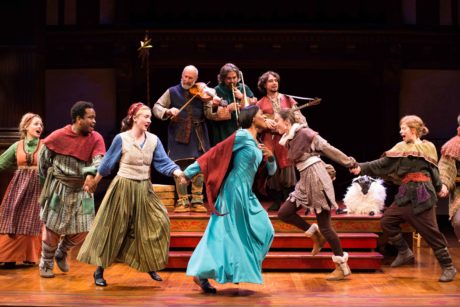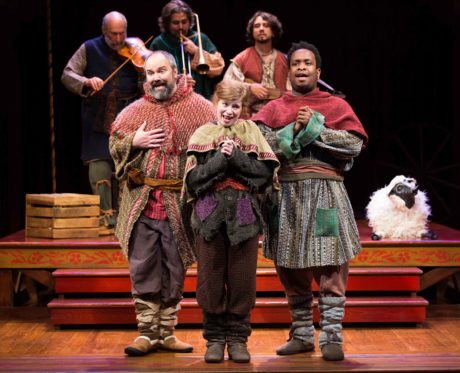Watching the Folger Consort’s robust and warmhearted staging of this medieval mystery play, I was struck by how curiously it connects us today to the audiences who first saw it performed. Here we were twenty-first-century citizens of a nation that didn’t exist when acting troupes took this show on the road to town squares. And what worked then was working again.

I don’t mean all the lovely period music that Adapter and Director Mary Hall Surface has artfully interpolated into the plot. I’m not talking about the fine cast of musicians-actors-singers-dancers-puppeteers who enact the age-old material both boisterously and reverently. And I’m not referring to the terrific period-ish peasant attire by Costumer Adalia Tonneyck. No, I mean the way the storytelling built into the structure of The Second Shepherds’ Play funnels us from earthy fun and farce into an experience of transcendent meaning as if neither time has elapsed nor anything in us as human beings has changed.
Few of the townsfolk in the Middle Ages knew how to read, and few escaped the poverty of the class they were born into. Theater back then was an educational outreach arm of the Church of Rome, totally subject to its rules. Women were totally subject to men’s rules as well, since husbands literally owned their wives as chattel property. Life was brutish, nasty, and short, and the Christian mystery plays were created to save souls on the fly.
Yet here we were comfortably ensconced in the august Folger Theatre, relatively well educated and well-off in a secular society, way past passage of the Married Women’s Property Acts (if not the Equal Rights Amendment), and here we were digging broad comedy worthy of the Marx Brothers or Three Stooges that begins with woebegone shepherds complaining of the weather and the rich but most of all their shrewish, unappealing wives.
Here, for instance, is a taste of the play’s casual misogyny in a speech by the shepherd Gib (written as is the whole play in a distinctive a a a a b c c c b rhyme scheme):
But, young men of wooing, for so God us wrought,
Beware well of wedding, and hold well in thought:
“Had I known” is a thing that serveth of nought.
Much constant mourning has wedding home brought,
And grief,
With many a sharp shower:
For thou mayst catch in an hour
What shall savour full sour
As long as thou lives.For as ever I read epistle, I have one [wife] by the fire,
As sharp as a thistle, as rough as a briar.
She is browed like a bristle, with a sour face dire.
Had she once wet her whistle she could sing like a choir
Her paternoster.
She is as great as a whale,
She has a gallon of gall:
By him that died for us all,
I would I had run till I lost her.
After the heist of one of their sheep by Mak, a fellow shepherd, the stolen critter is discovered concealed by Mak and his scheming wife Gill in a cradle as if it’s a newborn baby—and the play turns into a vulgar parody of the very Nativity the play was ostensibly written to promote.

Then suddenly the tone pivots again as if to a whole other play. An Angel appears to the shepherds and announces the birth of Jesus, and they’re off following a star toward Bethlehem in what becomes an exhilarating, glorifying, and totally smirk-free manger scene.
There awaits for those who attend The Second Shepherds’ Play at Folger Theatre an extraordinary experience in time travel back six centuries to the past as well as a remarkable theatrical passage from farce to faith. One might think both gaps unbridgeable—unless one has witnessed what happens in this exceedingly well-crafted show.
Running Time: 90 minutes, plus a 15-minute intermission.
The Second Shepherds’ Play plays through December 21, 2016, at The Folger Theatre – 201 East Capitol Street, SE, in Washington, DC. For tickets, call the box office at (202) 544-7077, or purchase them online.
LINKS:
‘Magic Time!’ ‘The Second Shepherds’ Play’ at The Folger Theatre by John Stoltenberg.
Review: ‘The Second Shepherds’ Play’ at The Folger Theatre by David Siegel.




